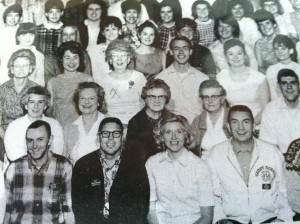“I hate, I despise your feasts, and I take no delight in your assemblies. Even though you offer me burnt offerings and grain offerings, I will not accept them; and the peace offering of your fattened animals, I will not look upon them” Amos the prophet
It happens to all of us at times; Events and moments which, in better times, would be pregnant with joy and meaning, are reduced to obligations. “Off to church with you” your mind says, on a Sunday morning, and so there you go. Singing; check. Prayer; check. Sermon…snore…; check. “Are we done yet?” your heart asks, wondering when this obligation can end, so you can get back to important things, like college basketball on TV, or paining the garage. The same attitude creeps into other things too, like marriage, music making, listening to person with whom we’re speaking, and more.
If religion is defined as a set of rituals designed to bring us close to God, then the Bible is arguably a decidedly anti-religious book. God, you see, provided “rituals” and “structures” so that people who wanted to worship God could do so. The longing for worship though, had mostly to do with the heart, much less with the ritual. It’s terribly easy to substitute religious ritual for the awe and wonder that arise in hearts that are longing for, and committed to actually loving God. This happened over and over again in the history of God’s people. Once, when some bad stuff happened, they thought, “We need to repent.” So they tore their clothes because that was what repentant people did back then. Then a prophet came along and said, “Rend your heart, not your garment” exposing the fact that they’d substituted religion for reality.
Amos, above, unfurls a long list of religious activities that have lost their meaning. This week I’m studying a favorite story about Jesus at a wedding where there’s no wine. Everything’s in place; rabbi, guests, bride, groom, rituals, water pots used to ritually cleanse people. Everything’s there…except the wine. The problem though, is that wine, then even more so than now, represents joy, blessing, fruitfulness, hope, life, abundance. It was, throughout Israel’s history, the sign that everything’s going to be alright. No wine, in that setting, was like everyone knowing you had a bad credit rating – it didn’t bode well for your future.
Jesus’ solution isn’t to cancel the wedding, or destroy the rituals and ceremonies. Instead he takes the ceremony and infuses it with abundance and joy. He turns the ceremony into something life giving. He turns water into wine – and not just any wine; the best wine, so that the people of the ceremony are able to bless each other with joy and gladness. Sadly, this is often a contrast to the anxiety, fear, control, guilt, and legalism that characterize the people of God. They may be saved from hell, but of course the reality is that they’re only saved from something in order to be saved into something else. That something else is called gladness, generosity, unconditional, peacemaking, and more. It looks like Jesus, and tastes like the best wine.
To take all that and reduce it to mandatory church attendance and abstaining from certain behaviors is precisely what the prophets, and God, hate. They hate it because it’s such a shabby substitute for the joy that is our calling.
Some folks have decided to skip the ceremonies entirely, believing that the wine will never be found there. This is a huge mistake. The problem isn’t the ceremony – it’s the human heart. The ceremonies are a marvelous context for the joy that is Christ to be revealed and celebrated. They are the wineskins, the stone waterpots, the wedding. The answer isn’t to destroy the ceremonies. Fill them – with Christ.
HOW?
Presence. A wise person once said, “whatever your hand finds to do, do it with all your might”, which is another way of saying “wherever you are, be all there”. It’s in our nature to be distracted, and this tendency has increased exponentially as technology provides the possibility of disengagement from the present moment, in exchange for a virtual one. You’ll be happier if you silence your phone during conversations with real people and do your e-mail in chunks if possible, rather than allowing them to rule your day.
Jesus concludes each of his parables by asking, “Are you listening? Really listening?” It’s a question we should be asking all day. To the extent that the answer is no, we’re missing out on tasting the wine, sharing the wine, becoming the wine. The good news is that you can learn to listen. The discipline of meditation is a great place to start.
Sense. Why God invite us to “taste and see” that the Lord is good? It’s because the character of God is revealed through all our senses. Listen to music. Smell the sap of the fir tree. Taste your food. Let you toes sink down into the soil. Feel the water on your body in the shower. Savor that kiss. O, and don’t only savor the pleasure. Be present with the pain too. When we confine our notion of revelation to Bible study or God talk, we cut ourselves off from most of the ways we can perceive God. We need a more sensual Christianity, but that’s a story for another day.
Obedience. The water became wine when some people listened to Jesus and did what he said. That’s still happening today, of course. I spoke with someone yesterday who is heading to Costa Rica in a few weeks to serve some people there. Her obedience will help the wine to flow, both in her life, and in the lives of those she touches. Others are taking steps of obedience with their money, their sexuality, by forgiving someone, or reaching out to love someone in a time of need.
Without these steps, things like church attendance, song singing, and Bible reading, slowly get drained of meaning. All you’re left with are some stone pots used for rituals. In the end though, our world doesn’t need or want mere rituals -they need the wine. May the wine of Christ fill your rituals this lenten season, so that you might be know and share the blessings of real life!
Of the three disciplines, (presence, sense, obedience) which is most challenging for you? Why?











